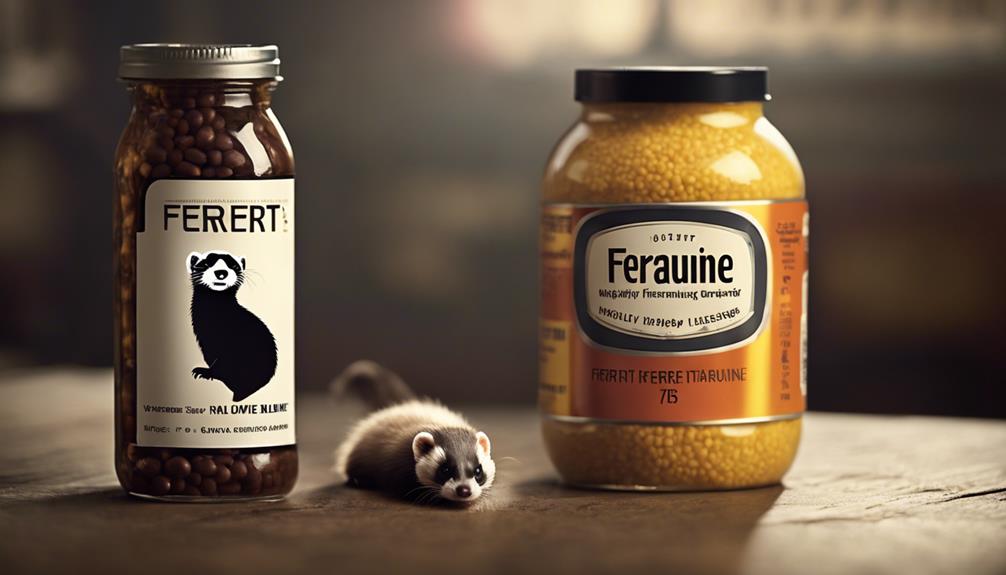When Is Taurine Supplementation Necessary for Ferrets?

When considering taurine supplementation for ferrets, there are several key factors to evaluate for optimal health. Firstly, it is important to assess the ferret's diet to ensure it is taurine-deficient. This can be done by checking the ingredient list of their food and consulting with a veterinarian. Secondly, observe any symptoms of taurine deficiency in the ferret, such as lethargy, weight loss, or heart issues. If these symptoms are present, supplementation may be necessary. Lastly, always consult with a vet before starting any supplementation to determine the proper dosage and ensure it is safe for your ferret's individual health needs.
In conclusion, taurine supplementation for ferrets should be considered when there is a verified taurine deficiency in their diet, symptoms of deficiency are present, and under the guidance of a veterinarian. Proper evaluation and monitoring are essential to ensure the optimal health and well-being of your ferret.
Importance of Taurine for Ferrets
Taurine plays a crucial role in the overall health and well-being of ferrets, supporting various essential functions in their bodies. As obligate carnivores, ferrets have specific nutritional requirements that include a higher protein and fat content in their diet. Taurine, an amino acid, is one such essential nutrient that ferrets need in adequate amounts for optimal health.
One of the key taurine benefits for ferrets is its role in maintaining healthy eyesight. Taurine is essential for proper retinal function, and a deficiency can lead to vision problems in these animals. Additionally, taurine is crucial for cardiovascular health in ferrets. It helps regulate heart contractions and maintain the overall function of the cardiovascular system.
Given the importance of taurine in supporting vital functions like vision and heart health in ferrets, ensuring that their diet meets their nutritional requirements for this amino acid is essential for their overall well-being. A balanced diet rich in taurine is crucial for keeping ferrets healthy and thriving.
Taurine Deficiency Symptoms in Ferrets

Taurine deficiency in ferrets can lead to a range of symptoms, including lethargy, retinal degeneration, and heart issues. These symptoms can have severe health implications, such as heart failure and vision problems, if left unaddressed.
It's crucial for ferret owners to be aware of these risks and to ensure their pets receive adequate taurine through proper nutrition or supplementation.
Symptoms of Deficiency
A deficiency in this essential amino acid can lead to various health issues in ferrets. Taurine plays a crucial role in maintaining their overall well-being, and signs of deficiency should be closely monitored to prevent further complications. Common symptoms of taurine deficiency in ferrets include lethargy, poor coat condition, and vision problems. It may also manifest as heart issues, such as dilated cardiomyopathy, and reproductive abnormalities. If any of these signs are observed, dietary adjustments to increase taurine intake should be made promptly. Regular vet check-ups are essential for monitoring progress and ensuring the ferret's health is improving. Early detection and intervention are key in managing taurine deficiency in ferrets.
| Taurine Deficiency Symptoms in Ferrets | |
|---|---|
| Lethargy | Poor Coat Condition |
| Vision Problems | Dilated Cardiomyopathy |
| Reproductive Abnormalities |
Health Implications & Risks
Symptoms of taurine deficiency in ferrets can have serious health implications and risks if left untreated. Taurine research has shown that a lack of this essential amino acid can lead to various health issues in ferrets. Some of the health implications and risks associated with taurine deficiency include:
- Cardiac abnormalities
- Retinal degeneration
- Reproductive problems
- Weak immune system
To prevent these risks, ensuring an adequate intake of taurine through dietary sources is crucial. Taurine is found in meat, particularly in heart and liver, making it essential to include these foods in a ferret's diet. Monitoring the ferret's taurine consumption is vital to maintain optimal health and prevent the serious implications of taurine deficiency.
Health Conditions Requiring Taurine Supplementation

Taurine supplementation is crucial for maintaining optimal heart health in ferrets, as this amino acid plays a vital role in cardiac function and can help prevent heart-related issues.
Additionally, taurine is essential for the proper functioning of a ferret's eyes, helping to prevent vision problems that may arise due to deficiencies.
Ensuring adequate taurine levels through supplementation can significantly contribute to the overall well-being and health of ferrets.
Essential for Heart Health
In ferrets, maintaining adequate levels of taurine is crucial for optimal heart function and overall cardiovascular health. Taurine plays a vital role in supporting the heart muscle's electrical activity, ensuring proper contraction and relaxation.
- Regulates Heartbeat: Taurine helps regulate the heartbeat, ensuring it beats at a steady and healthy rhythm.
- Prevents Arrhythmias: Adequate taurine levels can help prevent arrhythmias, irregular heartbeats that can be detrimental to a ferret's health.
- Supports Cardiovascular Function: Taurine supports overall cardiovascular function, promoting efficient blood circulation throughout the body.
- Maintains Heart Health: By supporting heart muscle function, taurine contributes to maintaining the ferret's heart health and reducing the risk of cardiovascular diseases.
Prevents Vision Problems
Maintaining optimal levels of taurine in ferrets is essential for preventing vision problems associated with taurine deficiency. Taurine benefits eye health by supporting the function of photoreceptor cells in the retina, which are crucial for vision.
Without adequate taurine levels, ferrets may experience vision impairments such as poor night vision, blurred vision, or even total blindness. Taurine plays a vital role in maintaining the structure and function of the eye, particularly the retina, where it acts as an antioxidant and helps protect against oxidative damage.
Taurine Levels in Ferret Diets

A critical aspect to consider when formulating diets for ferrets is the adequate incorporation of taurine to ensure their nutritional requirements are met. Taurine is an essential amino acid for ferrets, and its levels in their diets play a crucial role in maintaining their overall health and well-being.
- Taurine Requirements
- Ferrets have a high requirement for taurine compared to many other domestic animals.
- Taurine deficiency can lead to severe health issues in ferrets, making it vital to ensure adequate levels in their diets.
- Dietary Sources
- High-quality commercial ferret foods are formulated to meet the taurine requirements of these animals.
- Raw meat, particularly heart and liver, can also be good sources of taurine for ferrets.
Ensuring that ferret diets contain sufficient levels of taurine is essential for preventing potential health problems associated with taurine deficiency. By selecting appropriate commercial foods or supplementing with taurine-rich foods, ferret owners can help maintain their pets' optimal health and vitality.
Risks of Taurine Deficiency in Ferrets

Considering the critical role taurine plays in the overall health of ferrets, a deficiency in this essential amino acid can pose significant risks to their well-being, highlighting the importance of maintaining adequate levels in their diets. Ferrets have specific dietary requirements, including the need for taurine to support various bodily functions. Taurine benefits the cardiovascular system, eyesight, and overall metabolic health of these animals. Without sufficient taurine intake, ferrets can experience severe health issues due to taurine deficiency, such as dilated cardiomyopathy, retinal degeneration, and impaired immune function. To emphasize the impact of taurine deficiency, the table below provides a comparison between a healthy ferret with adequate taurine levels and a ferret suffering from taurine deficiency.
| Aspect | Healthy Ferret | Ferret with Taurine Deficiency |
|---|---|---|
| Cardiovascular Health | Normal heart function | Risk of dilated cardiomyopathy |
| Vision | Clear eyesight | Potential retinal degeneration |
| Immune System | Strong immunity | Impaired immune response |
Taurine Supplementation Guidelines for Ferrets

Proper taurine supplementation is essential for ensuring the optimal health and well-being of ferrets. When considering taurine supplementation for ferrets, it's crucial to follow specific guidelines to maintain their health effectively. Here are some important points to consider:
- Taurine Dosage: Ferrets typically require around 50mg of taurine per day to meet their nutritional needs. It's essential to provide the correct dosage to prevent deficiencies.
- Monitoring: Regularly monitoring the ferret's taurine levels can help ensure they're within the appropriate range. This can be done through blood tests recommended by a veterinarian.
- Behavioral Changes: Observing behavioral changes in ferrets can be an indicator of taurine deficiency. If a ferret shows signs of lethargy or decreased activity, it may be necessary to adjust their taurine intake.
- Energy Levels: Adequate taurine levels are crucial for maintaining the energy levels of ferrets. Proper supplementation can help keep them active and healthy.
Consulting a Veterinarian for Taurine Needs

When addressing the taurine needs of ferrets, consulting a veterinarian is crucial to ensure appropriate supplementation and monitoring. Veterinarian consultation is essential for determining if a ferret requires taurine supplementation based on its individual needs and health status.
A veterinarian can conduct tests to assess taurine levels in the ferret's body and recommend dietary adjustments if necessary. Taurine levels can vary among ferrets, and some may require specific amounts of taurine in their diet to prevent deficiency-related health issues. By consulting a veterinarian, ferret owners can receive tailored advice on how to meet their pet's taurine needs effectively.
Additionally, a veterinarian can provide guidance on the proper sources of taurine in a ferret's diet, ensuring that the supplementation is safe and beneficial. Regular check-ups with the veterinarian can also help monitor the ferret's taurine levels over time and make any adjustments as needed.
Frequently Asked Questions
Can Ferrets Get Taurine From Natural Sources in Their Diet, or Is Supplementation Always Necessary?
In considering taurine for ferrets, it's vital to note that while natural sources like meat provide some taurine, supplementation may be necessary for optimal health. Synthetic taurine can also be used.
Are There Any Specific Brands or Types of Taurine Supplements That Are Recommended for Ferrets?
When considering taurine supplementation for ferrets, it's crucial to choose reputable brands that offer appropriate taurine dosage. Look for supplements specifically designed for ferrets to ensure proper benefits and avoid potential side effects.
How Quickly Can Taurine Deficiency Symptoms Improve Once Supplementation Begins?
When addressing taurine deficiency symptoms in ferrets, rapid improvement can be observed once supplementation begins. This improvement is crucial due to the limited efficiency of taurine absorption from dietary sources in ferrets.
Are There Any Alternative Methods for Increasing Taurine Levels in Ferrets, Aside From Supplements?
Dietary adjustments can help boost taurine levels in ferrets. Introducing taurine-rich foods like meat, fish, and eggs can naturally enhance their intake. Additionally, engaging them in interactive play and providing enrichment activities can promote overall well-being and health.
Can Ferrets Overdose on Taurine if They Are Given Too Much Supplementation?
Excessive taurine supplementation can lead to taurine toxicity in ferrets. This occurs when the body's ability to absorb taurine is overwhelmed, causing potential health issues. Monitoring taurine levels and following recommended dosages is crucial to prevent overdose.











